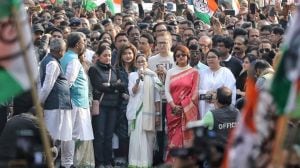A wedding for the aam aadmi?
Orchids from Thailand, a different decor for each wedding function, fancy invitation cards, costing a couple of hundreds apiece; garments gl...

Orchids from Thailand, a different decor for each wedding function, fancy invitation cards, costing a couple of hundreds apiece; garments glittering with crystals; menus representing the exotic cuisines of the world; hundreds 8212; make that thousands 8212; of guests, representing the Who8217;s Who of India; media cameras poised to record every moment. It is all this that makes for a successful wedding today.
Weddings in India are meant to be a statement of a person8217;s status. The father8217;s izzat is linked to how well he can pull it off. But when a politician conforms to the general pattern, it disappoints, even jars. It jars even more when the politician is from the Congress fold. This is not to say that leaders from other parties have not held wedding extravaganzas, but when those from a party swearing by the 8220;aam aadmi8221; hold events that could rival anything that the zamindars of yore had ever staged, the hypocrisy of it comes sharply into view.
Over the last two weeks, there has been a spate of extravagant Congress weddings. Remember, this is a party that has laid claim to the legacy of Gandhi, that purports to speak on behalf of the poorest Indian, that won an election recently on these very claims. It is also surprising that Congressmen and women 8212; usually so keen to emulate the party8217;s First Family 8212; hardly make an effort to follow the model set by the Nehru-Gandhi family for the last 60 years. When Indira married Feroze, she wore no jewellery 8212; only flowers adorned her. Her pink khadi sari was spun by Jawaharlal Nehru himself, even as he devised a very special wedding ceremony at Anand Bhavan for his only child. That, of course, was a different era. Decades later, Rajiv and Sonia tied the knot at 1, Safdarjung Road. Those who attended it say that it was a very select gathering which had witnessed them exchanging garlands and then signing the register on the lawns of Indira Gandhi8217;s house. Later there was a dinner for around 40 to 50 people. For all the family8217;s links with Jammu and Kashmir, the only person who was invited to attend the function from the state was not the chief minister, not the governor, not a minister, not a businessman. It was a person called Ramzana, a 8216;ghoriwalla8217;, who used to take Rajiv around on the pony whenever the family visited the state.
Sanjay Gandhi8217;s wedding to Maneka was held in the home of family friend, Mohammed Yunus, and each side came with only 15 people. More recently, at Priyanka8217;s wedding at 10, Janpath, Sonia carried forward the tradition and in order to limit the numbers, she had to call only one person from each family among a large number of relatives. She also showed that it was possible to do things aesthetically, and with care, without opulence.
It is not as if Nehru could not afford a more extravagant wedding for his daughter or, for that matter, Indira Gandhi, for her sons. She was the prime minister at the time, after all. Or that Sonia could not have had thousands of people come for Priyanka8217;s wedding. The point is that they chose not to do so. Nehru he, incidentally, had had a lavish wedding which he described in his autobiography believed in the saying that marriage is 8220;a public declaration of private intention8221;, something to be shared with an intimate circle of friends and family who constitute what is called the 8216;biradari8221;.
There are two other aspects to this issue. The first is an obvious one: the pressure that such extravaganzas place on the families of brides, who are left holding the bills in most cases. The familiar plague of dowry demands and its link to dowry deaths are too well-known to be delineated here. Despite changing lifestyles and perceptions, families 8212; from every strata of society 8212; continue to worry over the marriages of their daughters.
Second, it is the rich and powerful who set the standards. They may be able to afford it, they may claim to have earned their money 8220;honestly8221;, they may claim to be against the practice of dowry, but there is a spin off effect of what they do because of their status. Their actions set goals for others, define expectations and compel many to resort to dubious means in order to fulfil them. It goes without saying that it is black money that is fuelling much of the conspicuous consumption that is being showcased in our weddings.
Pakistan has recently introduce a law prohibiting the serving of dinner on the marriage day, an event that is normally the responsibility of the girl8217;s family. The J038;K government also moved a Bill not long ago limiting what is to be served on the wedding day. But this is not a matter of law alone. It is a question of sensitivity and of social responsibility. Politicians today are trying to ape the weddings of the super-rich, the Laxmi Mittals and Subroto Roys. In doing so, they reveal a mindset that is far removed from the concerns of ordinary people. That is why a public display of wealth by them comes across as vulgar. After all, public office means public accountability and the setting of public standards.
- 01
- 02
- 03
- 04
- 05































